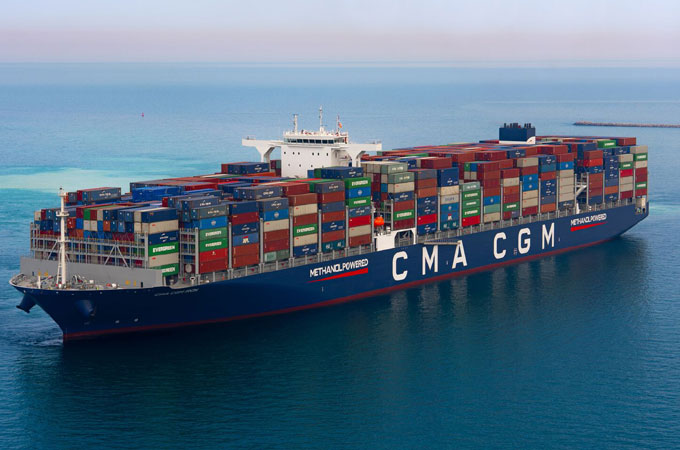AD Ports Group, a leading facilitator of global trade, logistics, and industry, has signed a collaboration agreement with Masdar, Advario and the CMA CGM Group to explore the feasibility for the development of a state-of-the-art e-methanol bunkering and export facility at Khalifa Port and Khalifa Economic Zones Abu Dhabi – Kezad Group.
The project will provide critical infrastructure to complete the supply value chain and bridge commercial e-methanol production with key off-takers, such as CMA CGM, in support of accelerating the decarbonisation of the global shipping industry.
The agreement also reinforces the UAE-France strategic partnership, fostered through the High-Level Business Council held annually between both countries, further leveraging mobilisation of the private sectors to deliver sustainable economic development and partnerships.
Saif Al Mazrouei, Chief Executive Officer- Ports Cluster, AD Ports Group, said: “The signing of this agreement marks an important milestone in our journey towards creating a more sustainable and environmentally responsible maritime industry. The development of an e-methanol bunkering and export facility in Khalifa Port will not only support the growth of the shipping industry, but also contribute to the reduction of carbon emissions and the promotion of clean energy sources. We are proud of this partnership with distinguished corporations, and are confident to make a positive impact on the environment and the economy."
Dr Faye Al Hersh, Head of Green Hydrogen Business Development (UAE), Masdar, said: “Green hydrogen and its derivatives, such as e-methanol, are pivotal in decarbonising hard-to-abate sectors like shipping, helping drive the global shift toward net zero. With over 80 percent of global trade transported by sea, fostering strategic partnerships is essential to establishing robust green hydrogen value chains and ensuring a more sustainable maritime industry. E-methanol has the potential to revolutionise the shipping sector by offering a viable pathway to significantly cut emissions. By collaborating with AD Ports Group, Advario and CMA CGM, we are strengthening the UAE’s position as a leader in sustainable innovation and making meaningful strides towards a cleaner, greener future.”
Bas Verkooijen, Advario CEO, said: "At Advario, we are committed to supporting the energy transition through innovation and collaboration. We are pleased to be partnering with Masdar, AD Ports Group, and CMA CGM to assess the feasibility of developing innovative solutions that will drive long-term, sustainable progress for the maritime industry.
“This partnership not only strengthens our position in the UAE's chemicals and new energy sectors, but it also underlines our commitment to working alongside our customers and partners to accelerate the decarbonisation of critical industries."
Christine Cabau Woehrel, Executive Vice President for Assets and Operations, CMA CGM Group, said: “At CMA CGM, we are accelerating the decarbonation of shipping by investing in low-carbon solutions, with a fleet of more than 153 vessels capable of using low-carbon energies and synthetic fuels such as e-methanol operational by 2029. This collaboration marks a key milestone in developing the necessary infrastructure to scale up sustainable fuels, which are strategic for our industry's energy transition.”
The collaboration agreement follows a memorandum of understanding signed in 2023 between AD Ports Group and Masdar to explore the development of a green hydrogen hub within KEZAD. Last year, Masdar also signed a strategic supply partnership with CMA CGM to assess the long-term provision of green maritime fuels for the company’s fleet.
Today’s new agreement aligns with the Abu Dhabi Low Carbon Hydrogen Policy and the UAE’s National Hydrogen Strategy, which targets the scaling up of local hydrogen production to 1.4 million tonnes per annum by 2031 and 15 million tons per annum by 2050. It also corresponds with the nation’s Net Zero by 2050 strategic initiative, which focuses on decarbonising hard-to-abate sectors by 2050, said a statement. - TradeArabia News Service































